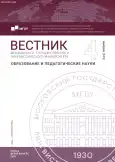Artificial Intelligence in Teaching and Learning: Revisiting the Problem of Educational Product Quality
- Authors: Aleynikova D.V.1,2
-
Affiliations:
- Moscow State Linguistic University
- Peoples’ Friendship University of Russia
- Issue: No 4 (849) (2023)
- Pages: 16-20
- Section: Pedagogical Studies
- URL: https://journal-vniispk.ru/2500-3488/article/view/336206
- ID: 336206
Cite item
Abstract
The rapid development of smart technologies, including generative artificial intelligence, is reflected in education. The article discusses modern educational trends, highlights the problematic aspects that are associated with the credibility of the data presented, as well as the need to control them by users themselves. The author stresses the need for the appropriate training of future specialists in the field.
About the authors
Darya Viktorovna Aleynikova
Moscow State Linguistic University; Peoples’ Friendship University of Russia
Author for correspondence.
Email: festabene@mail.ru
PhD (Pedagogy), Associate Professor, Department of Linguistics and Professional Communication in the Field of Law, Institute of International Law and Justice, Moscow State Linguistic University; Associate Professor, Department of Russian Language №5, Russian Language Institute, Peoples’ Friendship University of Russia (RUDN University)
Russian FederationReferences
- Zawacki-Richter O. et al. Systematic review of research on artificial intelligence applications in higher education – Where are the educators? / O. Zawacki-Richter, V. L. Marín, M. Bond, F. Gouverneur // International Journal of Educational Technology in Higher Education. 2019. Vol. 16. No. 39. DOI: https://doi. org/10.1186/s41239-019-0171-0.
- Artificial intelligence and education. A critical view through the lens of human rights, democracy and the rule of law / Holmes, W. [et al]. Strasbourg: Council of Europe Publishing, 2022.
- Ma W. et al. Intelligent tutoring systems and learning outcomes: A meta-analysis / W. Ma, O. O. Adescope, J. C. Nesbit, Liu Q. // Journal of Educational Psychology. 2014. No. 106. Vol. 4. P. 901–918. doi: 10.1037/a0037123.
- Byrne R. et al. eGrader, a software application that automatically scores student essays: with a postscript on ethical complexities / R. Byrne, M. Tang, J. Tranduc, M. Tang // Journal of Systemics Cybernetics and Informatics. 2010. No. 8. Vol. 6. P. 30–35.
- Holmes W., Bialik M., Fadel C. Artificial intelligence in education: promises and implications for teaching and learning // Center for Curriculum Redesign. Boston, 2019.
- Nazaretsky T., Cukurova M., Alexandron G. An instrument for measuring teachers’trust in AI-based educational technology // LAK22: 12th International Learning Analytics and Knowledge Conference. 2021. P. 56–66. DOI: 1145/3506860.3506866.
- Lovato S. B., Piper A. M., Wartella E. A. Hey Google, do unicorns exist?: conversational agents as a path to answers to children’s questions // Proceedings of the 18th ACM International Conference on Interaction Design and Children, IDC. 2019. P. 301–313. URL: https://doi.org/10.1145/3311927.3323150.
- Kandlhofer M. et al. Artificial intelligence and computer science in education: From kindergarten to university / M. Kandlhofer, G. Steinbauer, S. Hirschmugl-Gaisch, P. Huber // IEEE Frontiers in Education Conference. 2016. P. 1–9. DOI: https://doi.org/10.1109/FIE.2016.7757570
- Long D., Magerko B. What is AI literacy? Competencies and design considerations // Proceedings of the 2020 chi conference on human factors in computing systems. 2020. P. 1–16. DOI: https://doi.org/10.1145/3313831.3376727
- Miao F. et al. AI and education: A guidance for policymakers / F. Miao, W. Holmes, R. Huang, H. Zhang. UNESCO Publishing, 2021.
- Яроцкая Л. В., Алейникова Д. В. Актуализация содержания обучения студентов социально-гуманитарного профиля подготовки в контуре искусственного интеллекта // Вестник Российского университета дружбы народов. Серия: Психология и педагогика. 2023. Т. 20. № 1. С. 145–162. DOI: http://doi.org/10.22363/2313-1683-2023-20-1-145-162
Supplementary files









